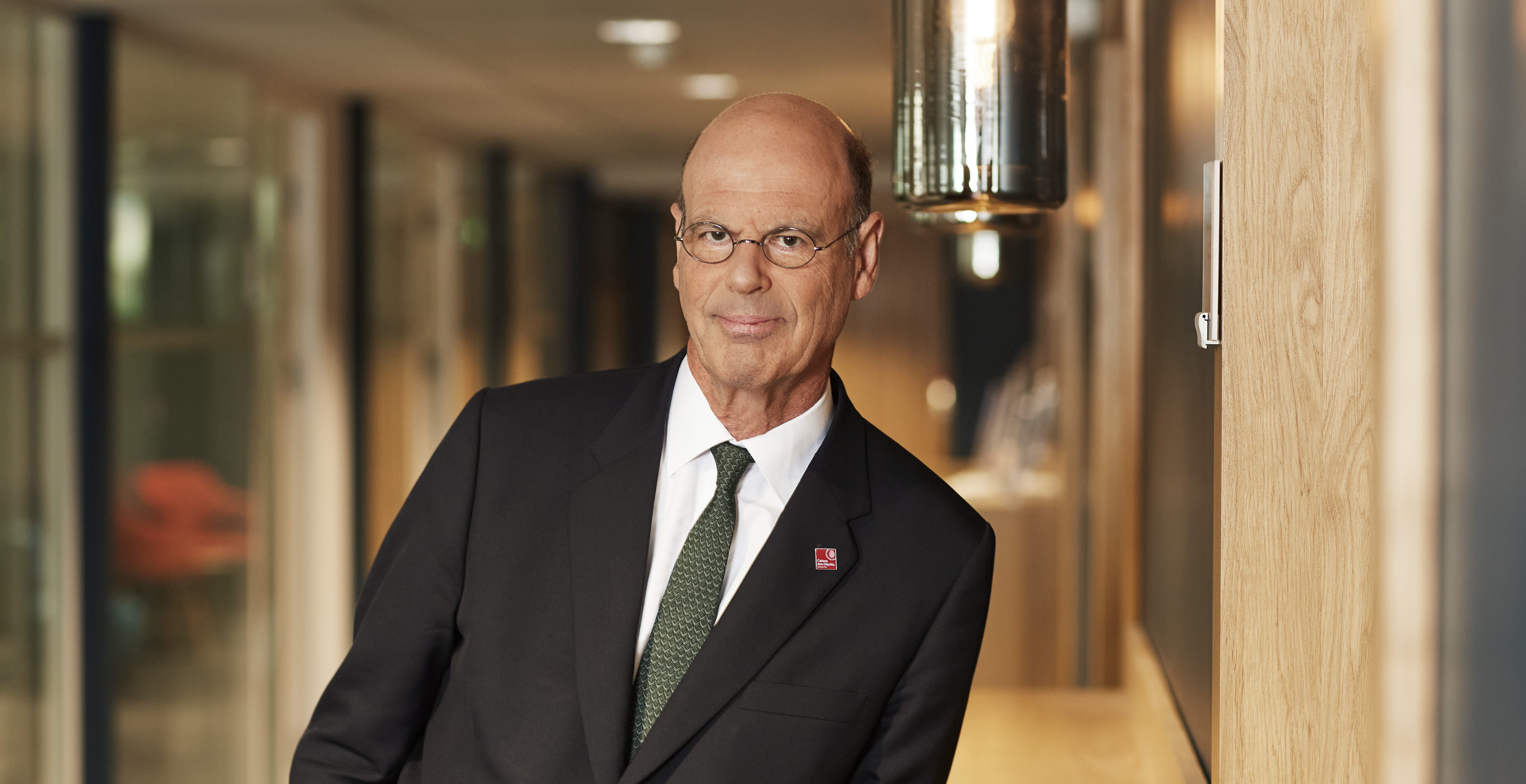Éric Lombard (H.81), elected HEC of the year

It is a tradition: during the General Meeting of the HEC Alumni association, the HEC Alumni of the Year award is given to a graduate whose career and achievements are exemplary.
Last year, the award was jointly given to Thomas Jonas (H.93), an entrepreneur from Chicago who created an innovative meat substitute, and Agnès Pannier-Runacher (H.95), the Minister of Energy Transition. This year, Éric Lombard, the CEO of Caisse des Dépôts et Consignations, was honored for his actions. Adrien Couret, the president of HEC Alumni, took the opportunity to talk about his exceptional journey.
Éric Lombard, who has maintained a dual interest in finance and politics throughout his career, became the first CEO of Caisse des Dépôts in 2017, not coming from a civil service background. He could have already been named HEC Alumni of the Year at that time. However, in January 2023, he became the first CEO of Caisse des Dépôts to have his mandate renewed by the government. This represents a lot of new developments for a public institution created in 1816, over two hundred years ago.
Caisse des Dépôts plays a central role in implementing French economic policies. Journalists sometimes refer to it as the government’s “armed wing,” using a somewhat martial metaphor. With €1,300 billion invested and loaned into the French economy through a range of subsidiaries—including Bpi France, also led by an HEC graduate—the institution is a massive development force. Maneuvering such a large machine requires a certain level of dexterity.
A “reformist”
Éric Lombard was born in Boulogne-Billancourt and grew up in Troyes. He is the grandson of Pierre Lévy, who created the Devanlay textile group (which now markets famous polo shirts with a crocodile logo instead of a heart) and was also a renowned art collector. Éric inherited this passion and joined the board of directors of the Louvre in February 2023, along with another HEC graduate, Emmanuel Faber (H.86).
After completing his baccalauréat, he initially considered studying engineering. However, the prospect of focusing solely on mathematics did not excite him. To maintain a balance between humanities and social sciences, he decided to pursue higher studies in business. Thus, at the end of the 1970s, a long-haired rugby player arrived on the campuses of Jouy-en-Josas. He admitted not being particularly diligent, whether in sports or academics.
Beyond his achievements, it was a different initiative that marked his years of study. At the time, there were only two student unions at HEC: one on the right and the other affiliated with the Communist Party on the left. Not identifying with either of these political sensibilities, young Éric Lombard sought to create a third path by establishing a “reformist” left-wing union. This episode foreshadowed the divergent trajectory of his financial career, progressively driven by the defense of his convictions and the common good.
Mergers, acquisitions, and politics
In 1981, while envisioning himself becoming the CFO of an industrial group, the young graduate began an internship at Paribas Bank. He stayed there for a long time. However, his strong desire to engage in politics led him to join a working group responsible for preparing Michel Rocard’s presidential candidacy, alongside his responsibilities at Paribas.
Left-wing investment bankers were a rarity, but the management at Paribas welcomed his political engagement with interest and goodwill, promising to keep his position if he were to assume public responsibilities. Ultimately, Michel Rocard did not run for president, but he became the Prime Minister in 1988. Éric Lombard then joined the government. For four years, he served as an advisor to Louis Le Pensec and later Michel Sapin. Despite lucrative offers from an American bank, driven by his sense of ethics and loyalty, Éric Lombard returned to Paribas instead of pursuing the positions.
He values personal connections greatly. In fact, based on the advice of Pierre Vernimmen, his finance professor at HEC whom he held in high regard, he established the mergers and acquisitions department at Paribas during that time, which rapidly grew in activity. He described his work as an investment banker as “entertaining,” “fascinating,” and almost “addictive.”
In 2000, the bank became the BNP Paribas Group through one of the largest mergers ever conducted.
The 9/11 story
In September 2001, Éric Lombard was in New York to oversee the acquisition of an American bank located on the 95th floor of the World Trade Center. He had a meeting scheduled for 8:30 a.m. on September 11th with the bank’s management team. However, the bank’s president called to postpone the meeting because he had to accompany his son to school. At 8:45 a.m., two planes crashed into the Twin Towers. By a pure twist of fate caused by the rescheduled agenda, Éric Lombard narrowly escaped a deadly attack. He stayed in New York with his team for a week, stranded due to the airport closure and the interruption of air travel.
In 2004, he changed roles within the same group and became the CEO of Cardif, the insurance subsidiary of BNP Paribas. He was new to the sector, but performed well enough to earn the title of “Insurer of the Year” in 2012. He excelled to the point that he left BNP Paribas in 2013 to join the Italian insurer, Generali, as the CEO of their French operations. His challenge was to steer the company in the right direction after being severely impacted by the crisis. It was a successful gamble, as three years later, the group achieved a record operating profit of nearly €5 billion.
His skills as an investment banker, understanding of financial mechanisms, and leadership abilities led to his appointment as the head of Caisse des Dépôts by President Emmanuel Macron. Twice.
Published by La rédaction

